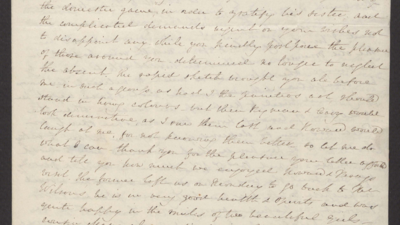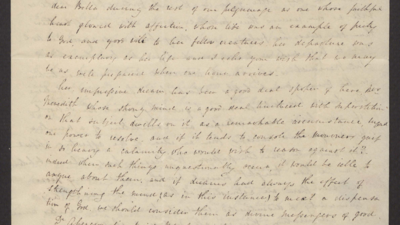Homage to Elie Wiesel: International Literary Peace Prize 1983 Ceremony Proceedings
Title
Date
Contributor
Summary
This document is a printed record commemorating the 1983 International Literary Peace Prize awarded to Elie Wiesel. It includes an overview of the prize's history, speeches, and messages from various dignitaries and organizations involved in the award ceremony held in Liège on April 23, 1983. Key individuals whose contributions are featured include Antoine Longueville (founder of the prize), Georges Sion (President of the Jury), William Ugeux (President of the Resistance Network Chiefs Committee), and Elie Wiesel himself, whose acceptance message reflects on the responsibility of survivors to bear witness and the enduring pursuit of peace amidst global conflicts. The document emphasizes the role of literature and human fraternity in promoting justice, democracy, and disarmament.
More Sources Like This
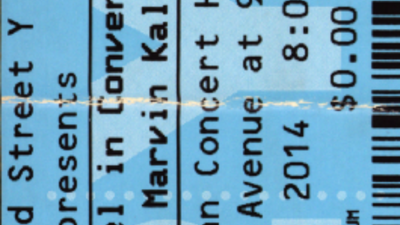
This document is an admission ticket for an event titled "Elie Wiesel in Conversation with Marvin Kalb" held at the Kaufmann Concert Hall of the 92nd Street Y. The event took place on Thursday, May 22, 2014, at 8:00 PM. The ticket indicates the seat location as Orchestra C, Seat 115, and states a price of $0.00, marked as Comp (Complimentary) and Premium. The reverse side details terms and conditions regarding ticket usage, management policies, and image rights during the event.
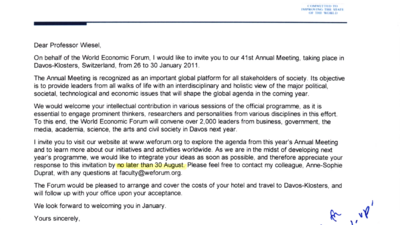
This document is an email invitation from W. Lee Howell, Managing Director and Head of Programming & Global Agenda Councils at the World Economic Forum, to Professor Elie Wiesel. The invitation is for the 41st Annual Meeting, scheduled to take place in Davos-Klosters, Switzerland, from January 26 to 30, 2011. The email highlights the meeting's role as a global platform for discussing political, societal, technological, and economic issues, and invites Professor Wiesel's intellectual contribution. It states that the Forum will arrange and cover the costs of his hotel and travel. A response to the invitation is requested by August 30. The document also includes information for online registration and notes that Jamie Moore and Mireille Bertolini-Cabezas were carbon-copied. Handwritten notes on the document read "Ew copy" and "M' We'll Wait fr klavs' follow-up."
of
Rita Harmelin
Rita Harmelin, nee Brauner, was born June 17, 1925 in Bucharest, Romania to Polish-born parents who returned to Poland in 1931. The family moved to Boryslaw an oil town. She describes her secular and religious education and interactions with local Poles and Ukrainians. Rita describes life under Russian occupation September 1939.
Rita's memories of the German invasion of Boryslaw, June 1941 include efforts of local Ukrainians to save Jews. She focuses on successive waves of pogroms encouraged by Germans and carried out by local Poles and Ukrainians. A Jewish quarter or ghetto was established in Boryslaw. There were periodic roundups leading to deportation. BertoldBeitz, a director in the local petrol industry and Mr. Siegemund rescued many Jews, including Rita from the deportations several times. Restrictions increased gradually. Many Jews worked in the Boryslaw petrol industry. A forced labor camp was established in 1943 for the Jewish workers guarded by Ukrainian volunteers. She mentions escape attempts by workers. Rita, her future husband Rolek, and 11 other people went into hiding in the home of a local Ukrainian from March to August 7, 1944 when Russian troops arrived and re-occupied Boryslaw. Her parents were deported before they could accept an offer to hide in a Polish woman’s house. Her mother was killed in Auschwitz, her father survived. Jews from Boryslaw were transported to Plaszow, Poland but the final transport, July 1944 went directly to Auschwitz.
Rita explains why resistance was difficult; the attitude of the Polish underground (ArmiaKrajowa) andmost Ukrainians toward Jews. Her post-war experiences include return to Poland; search for and reunion with her father in Austria in 1945; smuggling herself in and out of Poland. Rita and her father joined her husband (whom she married in Austria) in Australia on January 9, 1949. Rita mentions her guilt as a survivor and how she told her children about her past. She describes life as a Jew in Australia. She gives examples of acts of humanity and compassion by individual non-Jews (Polish, Ukrainian and German).
Interviewee: HARMELIN, Rita Date: April 26, 1992
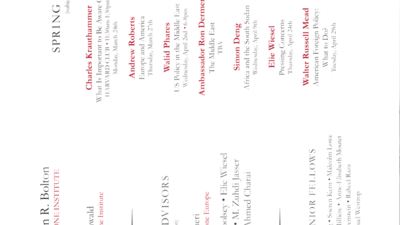
This two-page document from the Gatestone Institute outlines their "Spring Speaker Series" for 2014 and details their mission statement. Page one presents the schedule of lectures, listing prominent speakers such as Charles Krauthammer, Andrew Roberts, Walid Phares, Elie Wiesel, Walter Russell Mead, Frank Luntz, Garry Kasparov, and Mortimer Zuckerman. Each entry includes the topic, date, and sometimes the location (e.g., Harvard Club, Washington D.C.). The topics primarily revolve around US foreign policy, the Middle East, economic growth, and current geopolitical affairs. Page two provides the Gatestone Institute's mission statement, defining it as a non-partisan, non-profit international policy council and think tank focused on educating the public about global issues, advocating for democracy, human rights, and free markets. It also includes the institute's contact information and reiterates the list of distinguished speakers. The document indicates it is "BY INVITATION ONLY", functioning as a program and invitation for the event series.
